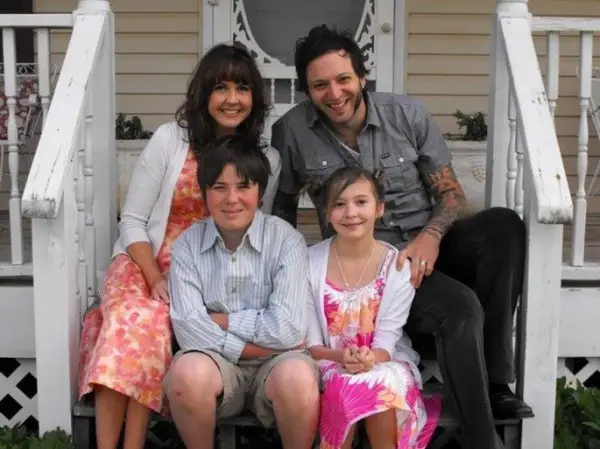What most teenagers dream of is to go to college, travel the world, and have many friends. 12-year-old Taylor Smith, of Johnson City, Tennessee, was no different. This girl spent her days around her family and friends and loved watching a lot of Doctor Who.
Smith outlined these plans in a letter she wrote to her future self in April 2013. The letter was placed inside a box in her room with the instruction “To be opened by Taylor Smith on April 12, 2023 only (unless said otherwise).”

Unfortunately, she didn’t live long enough to see whether those dreams would be accomplished. Just months after she wrote that letter, Taylor died of complications from a sudden onset of pneumonia.
Her parents, Tim and Mary Ellen Smith, were heartbroken. They couldn’t believe their girl was forever gone.
One day, as they were sorting through her possessions, they found the letter. As it touched them deeply, they decided to share it online and give others some solace.

As she shared her daughter’s letter, Marry Ellen wrote: “I can’t physically resurrect her, I can’t bring her back, but
I’m so grateful people have been inspired by her story.”

Below is Taylor’s letter and the words she wrote to herself.

Dear Taylor,
How’s life? Life is pretty simple right now (10 years in your past). I know I’m late for you, but as I’m writing, this is early, so; congratulations on graduating high school! If you didn’t, go back and keep trying. Get that degree! Are you (we) in college? If not, I understand. We do have pretty good reasoning, after all.
Don’t forget, it’s Allana’s 11th birthday today! Sheesh, 11 already? In my time, she just turned 1! I didn’t get to go to that party though, because I was in Cranks, Kentucky for my first mission trip. I’ve only been back for 6 days!
Speaking of, how’s your relationship with GOD? Have you prayed, worshipped, read the bible, or gone to serve the lord recently? If not, get up and do so NOW! I don’t care what point in our life we’re in right now, do it! He was mocked, beaten, tortured, and crucified for you! A sinless man, who never did you or any other person any wrong!
Now, have you gone on any more mission trips? Have you been out of the country yet? How about on a plane?
Is Doctor Who still on the air? If not, what regeneration did they end it with? You should go watch some Doctor Who! Later though, you gotta finish reading your own words of wisdom!
Do you have your own place yet? If we’re in college, what are we majoring in? Right now, I wanna be a lawyer.
Have you been to Dollywood recently? Right now, their newest attraction is the Wild Eagle. It’s so fun!
Also I think I’m going to sell my iPad and buy an iPad mini, Don’t forget to tell your kids that we’re older than the tablet! Attached I also have a drawing of an iPad, so you can show them.
Well, I think that’s all. But remember, it’s been 10 years since I wrote this. Stuff has happened, good and bad. That’s just how life works, and you have to go with it.
Sincerely, Taylor Smith
Beautiful words from an angel who was taken away from her family too soon!
If you were touched by Taylor’s words as much as we were, please share this story in her memory.
The Key Differences Between First, Second, and Third Marriages
Marriage is a dynamic journey, with each experience shaping your understanding of love, partnership, and personal growth. While every marriage is unique, the evolution from a first to a second and even a third marriage is marked by distinct shifts in priorities, expectations, and personal development. Understanding these changes can help individuals approach each stage of marriage with a more realistic and grounded perspective. In this article, we will explore the key differences between first, second, and third marriages and how each stage reflects personal growth and shifting priorities.
First Marriages: Idealism and Romance

First marriages are often viewed through rose-colored glasses. At this stage, love is typically infused with idealism, and couples often believe in the fairy-tale notion of “happily ever after.” This is the time when individuals are likely to experience the excitement of a fresh relationship and the joy of starting a life together.
The Role of Romance
Romantic love is at its peak in a first marriage, with partners deeply invested in the idea of forever. They tend to prioritize passion, chemistry, and shared dreams of the future. The early stages of a first marriage are often filled with excitement, adventure, and a sense of invincibility.
The Challenges
However, as the marriage progresses, the honeymoon phase tends to fade, and reality sets in. First-time married couples often struggle with conflict resolution, as they may not yet have developed the skills necessary to manage disagreements. Unrealistic expectations can also cause strain, as each partner expects the other to meet all of their emotional needs.
Second Marriages: Pragmatism and Realism
By the time many individuals enter a second marriage, they have gained experience from their previous relationship(s). As a result, second marriages tend to be more pragmatic and grounded in reality. While love is still important, it often takes a backseat to the lessons learned from the first marriage.
Video : Episode 5: Why Second & Third Marriages are Ending at Such a Staggering Rate
Learning from the Past
Second marriages are marked by a deeper understanding of oneself and the dynamics of a healthy relationship. Individuals are less likely to idealize their partner and more focused on compatibility, communication, and problem-solving. Past mistakes and experiences shape the way couples approach their new relationship, leading to more realistic expectations.
The Role of Compatibility
In a second marriage, couples often place a strong emphasis on compatibility, recognizing that love alone is not enough to sustain a long-term relationship. Practical considerations, such as shared values, interests, and lifestyle preferences, become essential factors in making the relationship work.
The Challenges
While second marriages are typically more stable, they can also come with their own set of challenges. Blended families, ex-spouses, and emotional baggage from the first marriage can complicate the dynamics of a second marriage. However, individuals who enter their second marriage with open eyes tend to be better equipped to handle these obstacles.
Third Marriages: Stability and Companionship
By the time individuals reach their third marriage, their priorities have shifted significantly. This stage of marriage is often defined by a focus on stability, companionship, and emotional security. Individuals in their third marriage are generally more self-aware, having learned from past mistakes and experiences.
Seeking Stability
For many, the third marriage is less about passion and more about building a secure, stable future together. After experiencing the ups and downs of two previous marriages, the focus shifts toward finding someone who can provide emotional support, understanding, and companionship. Practical factors like financial security, shared goals, and mutual respect become crucial.

The Role of Emotional Maturity
Emotional maturity is a hallmark of third marriages. By this point, both partners have likely developed the ability to communicate more effectively and navigate challenges with a calm, measured approach. The impulsiveness and intensity of earlier relationships are replaced by a more thoughtful and balanced approach to love and partnership.
The Challenges
While third marriages may seem more stable, they come with their own unique set of challenges. Older couples may face health issues, aging parents, or financial concerns, which can strain the relationship. Additionally, the complexities of blending families from previous marriages can still be a point of tension. However, individuals in their third marriage are often more adept at managing these challenges due to their increased emotional maturity.
Personal Growth Across Marriages
The progression from a first marriage to a second and third often mirrors significant personal growth. Each relationship provides lessons that shape how individuals approach their future partnerships.
First Marriage: The Idealist
In the first marriage, individuals often begin their journey with an idealistic view of love. They may enter the relationship expecting it to be perfect and free of conflict. This phase is about learning what it means to be a partner and what love truly entails. First marriages are often filled with hope and excitement, but they also offer important lessons in managing expectations and developing emotional resilience.
Second Marriage: The Realist
By the second marriage, individuals are usually more grounded. They’ve learned from their first marriage, and their expectations are more realistic. They understand the importance of communication, compromise, and emotional maturity. Second marriages are typically more stable because individuals are better equipped to handle the challenges that arise.
Third Marriage: The Pragmatist
By the third marriage, individuals have often reached a stage of emotional maturity and self-awareness. The focus is on emotional security, companionship, and building a stable life together. Third marriages are often less about intense passion and more about mutual respect, understanding, and support. Individuals who have been through two previous marriages are often more adaptable and better prepared for the realities of long-term partnership.
The Evolving Expectations of Marriage
Video : LOVE LESSONS – 125+ Years of Marriage Advice in 3 Minutes
As we move from one marriage to the next, our expectations shift. In a first marriage, we expect a lifetime of love and adventure. In the second, we seek balance and compatibility. By the third, the desire for stability and companionship takes center stage. This evolution is a natural part of personal growth, and each marriage represents a different chapter in our lives.
The Importance of Communication
No matter the stage of marriage, communication remains the foundation of a successful relationship. Open, honest dialogue allows couples to navigate their differences, express their needs, and strengthen their bond. In second and third marriages, couples often have better communication skills because they have learned from past experiences.
Conclusion: Marriage Is a Journey of Growth
Whether it’s the passion of a first marriage, the practicality of a second, or the stability of a third, each stage of marriage brings unique opportunities for growth and connection. As we navigate through life’s various chapters, our expectations, priorities, and understanding of love evolve. By embracing these changes, couples can build stronger, more fulfilling relationships that stand the test of time. The key is to learn from each experience, communicate openly, and prioritize what matters most—companionship, love, and mutual respect.



Leave a Reply